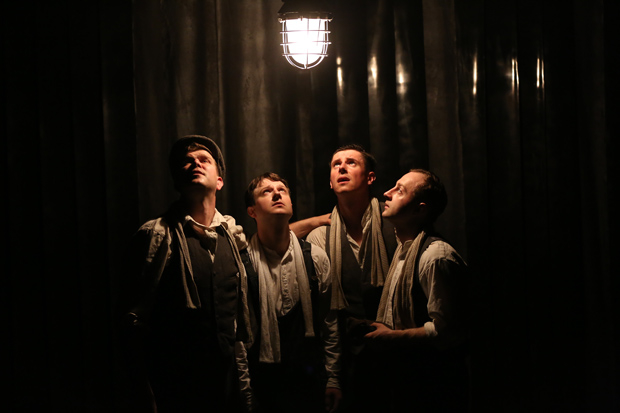Operation Crucible Forges Drama From History
A Nazi air raid on an English city buries four steelworkers alive in this off-Broadway play.

(© Carol Rosegg)
Known as the "Steel City," Sheffield was a center of English manufacturing for much of the 19th and 20th centuries. No surprise, then, that the Nazis targeted it in World War II. On December 12 and 15, 1940, German air raids killed 602 people and left fires raging through the city. The biggest loss of life occurred at a hotel, where, miraculously, a few people survived the seven-storey building's collapse. Kieran Knowles's Operation Crucible, now making its US premiere at 59E59 Theaters, vividly reimagines the lives of four of them.
In Knowles's rendering, which is "inspired by real events," their names are Arthur, Bob, Phil, and Tommy. All work at the same steel plant, hammering, brushing, and annealing. Much of their dialogue is delivered in rapid alternation, echoing the rhythm of their work. For example, in their description of the plant, each sentence is spoken by a separate character: "It were a big outfit. Massive. Huge operation. Smelted. Forged. Rolled. And finished a variety of products." This fused language reflects a bond shared by men who sweat, eat, and play cards together.
On the night of the bombing, they also suffer together. Evacuating the factory after the air raid sirens blare, they take shelter in the basement of a nearby hotel. There they cower and, once the building falls, endure the hell of being buried alive.
In this period of physical and spiritual darkness, the show's direction shines. Bryony Shanahan isn't afraid of murk any more than she is of silence; when a bomb hits the hotel, the audience is plunged into both. At last, Tommy's voice rings out: "Lads…lads?" In that moment, the audience is right there with him, unseeing, unsure, awaiting some sign that his companions are still alive.
Central to this moment's force and many others is the show's design team. Lighting designer Seth Rook Williams manages everything from just enough light to see the ghostly silhouettes of the four steelworkers trapped underground to the flames of a furnace flickering across their faces. Sound designer Daniel Foxsmith is no less versatile. You don't just hear bombs explode in this production; you also get the clatter of debris after they hit.
The ingenuity of the designers, director, and script is heightened by the cast. All convince as working-class Englishmen while remaining distinct personalities. Especially impactful are Salvatore D'Aquila as the greenhorn Bob, flailing physically and mentally as he tries to keep up with the demands of his job, and Christopher McCurry as the family man Phil. The latter's account of what happened to his wife and baby boy during the bombing draws tears from the audience.
The play's emotional whammy complements its historical specificity. Operation Crucible is deeply embedded in the time period it portrays (the very title is a translation of the German code name for the Sheffield raid), and the relatability of its characters' fear and caring keeps the show from dissolving into a haze of "Klaxons" (sirens) and "snap boxes" (lunch boxes). Knowles never explicitly broadens his focus to other wars or eras, but it's hard not to leave the theater without a sense that the same devastation, the same mutilation of families is continuing as bombs fall today in Syria and Yemen. His play is a reminder of both our humanity and our capacity for brutality.








